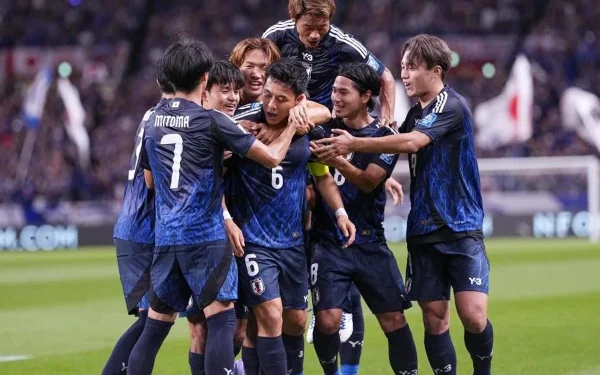Japan has once again cemented its place among the world’s top footballing nations by becoming the first team to qualify for the 2026 FIFA World Cup. The historic achievement came as the Blue Samurai topped their group in the third round of the Asian qualifiers, securing their ticket to the global tournament.
Japan Secures Spot in FIFA World Cup 2026
The Japanese national team confirmed their participation in the expanded 48-team tournament after a crucial 2-0 victory over Bahrain. This win not only secured Japan’s spot in the World Cup but also showcased their dominance in Asian football.
The match, played as part of the AFC (Asian Football Confederation) qualifiers, saw Japan put on an impressive display of skill and strategy. The victory was sealed with second-half goals from Daichi Kamada in the 66th minute and Takefusa Kubo in the 87th minute, ensuring Japan’s qualification ahead of other Asian contenders.
AFC Qualification Format and Japan’s Journey
The qualification process for the 2026 FIFA World Cup has been an intense battle for teams across Asia. The Asian Football Confederation (AFC) has allocated eight automatic spots for the tournament, with an additional opportunity for a ninth team to qualify through an intercontinental playoff.
The third round of Asian qualifiers consists of 18 teams, divided into three groups. The top two teams from each group will qualify directly for the World Cup, while the remaining teams will battle for playoff spots. Japan’s early qualification demonstrates their footballing prowess and consistency in international competitions.
Japan’s path to qualification was marked by outstanding performances throughout the earlier rounds. They dominated their group matches, securing victories against regional rivals with a blend of tactical discipline, technical excellence, and attacking flair.
Japan’s Consistent World Cup Appearances
Japan’s qualification for the 2026 FIFA World Cup continues their impressive streak of consecutive World Cup appearances. Since their debut in the 1998 World Cup held in France, the Blue Samurai have qualified for every edition of the tournament, making 2026 their eighth consecutive participation.
The team’s best performance in the tournament so far came in the 2002 World Cup, which was co-hosted by Japan and South Korea. They reached the Round of 16 before being eliminated by Turkey. Japan repeated this feat in 2010, 2018, and 2022, consistently proving themselves as one of Asia’s strongest footballing nations.
Star Performers Leading Japan’s Charge
Japan’s success in securing early qualification can be attributed to a strong squad featuring both experienced players and emerging talents.
- Daichi Kamada – The attacking midfielder played a crucial role in the match against Bahrain, scoring the opening goal in the 66th minute. Kamada, who has been a standout performer in European club football, continues to be an essential playmaker for Japan.
- Takefusa Kubo – The young forward sealed Japan’s victory with an 87th-minute goal. Kubo, who plays for Real Sociedad in Spain’s La Liga, is considered one of Japan’s most promising talents.
- Kaoru Mitoma – The Brighton & Hove Albion winger has been instrumental in Japan’s qualification campaign, providing speed and creativity on the left flank.
- Wataru Endo – The defensive midfielder and team captain has played a vital leadership role, ensuring stability in Japan’s midfield and defense.
Japan’s Strength in Asian Football
Japan has consistently been one of the dominant forces in Asian football, winning the AFC Asian Cup four times (1992, 2000, 2004, and 2011). The team’s success is built on a strong domestic football system, investment in youth development, and the increasing presence of Japanese players in top European leagues.
Japanese football has witnessed a steady rise since the establishment of the J.League in 1993. The league has served as a foundation for producing world-class talent, many of whom have gone on to play in elite European clubs, further strengthening Japan’s national team.
Expanding World Cup and Asian Representation
The 2026 FIFA World Cup will be a landmark tournament as it marks the first time the competition expands to 48 teams. The tournament will be hosted jointly by Canada, Mexico, and the United States, making it the first World Cup to be held across three nations.
With the expansion, Asia has been awarded more qualification slots, increasing from four or five teams in previous tournaments to at least eight. This change offers greater opportunities for Asian nations to showcase their talent on the world stage, and Japan’s early qualification highlights their position as a leading footballing nation in the region.
Looking Ahead: Japan’s World Cup Aspirations
With their place secured in the 2026 FIFA World Cup, Japan will now shift its focus to preparing for the tournament. Head coach Hajime Moriyasu will be looking to refine his squad and strategy as Japan aims to go beyond the Round of 16 and make a deeper run in the competition.
Japan’s recent performances in international tournaments suggest that they are capable of competing with the world’s best. Their memorable campaign in the 2022 FIFA World Cup saw them top a challenging group that included Germany and Spain before being eliminated by Croatia in the Round of 16 via penalties.
With an exciting blend of experienced players and young talents, Japan will be aiming to surpass their previous World Cup performances and possibly break into the quarter-finals or beyond in 2026.
Conclusion
Japan’s historic achievement as the first nation to qualify for the 2026 FIFA World Cup is a testament to their consistent excellence in football. Their dominant performance in the Asian qualifiers reaffirms their status as one of the continent’s top teams. With a strong squad, a dedicated coaching staff, and a football culture that continues to grow, Japan is poised to make a significant impact in the upcoming World Cup.
As the tournament draws closer, football fans across the globe will be keeping a close eye on the Blue Samurai as they prepare for their latest challenge on the world stage. The journey to 2026 has only just begun, and Japan’s qualification marks the first step in what promises to be an exciting tournament.

























